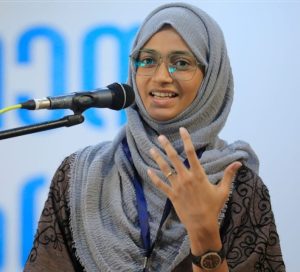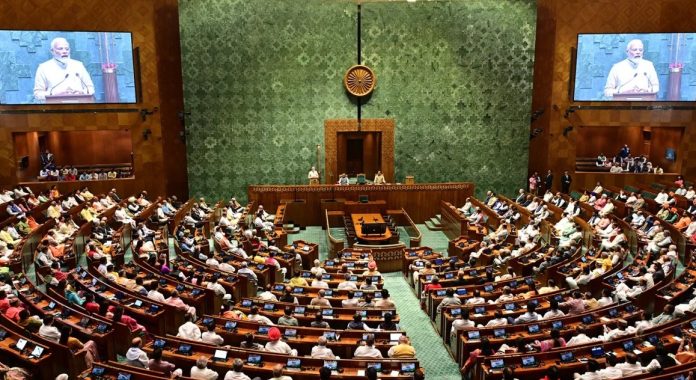 The Women’s Reservation Bill is on the verge of becoming an act. We have collected various opinions on the bill, which raises significant concerns regarding the empowerment of Muslim women. In this complex political landscape, it is essential to analyze the obstacles they encounter and whether this legislation effectively addresses their concerns. – Syed Ahmed Ali
The Women’s Reservation Bill is on the verge of becoming an act. We have collected various opinions on the bill, which raises significant concerns regarding the empowerment of Muslim women. In this complex political landscape, it is essential to analyze the obstacles they encounter and whether this legislation effectively addresses their concerns. – Syed Ahmed Ali
 Shayma S, PhD Scholar, JNU: The question of Muslim women’s representation is conspicuously absent from the larger political discourse. While all opposition parties have raised concerns about the exclusion of minority and OBC women from the Bill, it’s crucial to emphasize why this issue is significant.
Shayma S, PhD Scholar, JNU: The question of Muslim women’s representation is conspicuously absent from the larger political discourse. While all opposition parties have raised concerns about the exclusion of minority and OBC women from the Bill, it’s crucial to emphasize why this issue is significant.
As Sonia Gandhi pointed out, a caste census is urgently needed. It is widely understood that the caste census will likely reveal that OBCs constitute a majority of the nation, with a significant Muslim population within this group. In regions where there is robust OBC reservation, such as Kerala and some other states, we have witnessed Muslims gaining access to higher education and other opportunities within the public sphere. This represents a missed opportunity to diversify the Parliament.
Studies have consistently shown that when marginalized communities enter such spaces, they raise vital questions and challenge the prevailing discourse, working to empower their communities. For far too long, discussions about Muslim women in Parliament have occurred without the direct presence of Muslim women themselves.
Bills supposedly aimed at benefiting Muslim women are passed without genuinely considering their voices. The Women’s Reservation Bill (WRB) could have been a game-changer, but it has fallen short.
Furthermore, while it reserves some seats for SC/ST women, there is no mention of sub-reservation within one-third of ALL seats that will be reserved. In essence, this once again creates space for elite women to enter Parliament, rather than effectively challenging and bringing about tangible changes in the social and cultural power structures of Indian politics.
 Dr. Aysha Fidha, MPT (OBG), Mangalore, Karnataka: The bill promises enhanced representation for marginalized women but lacks a clear timeline for implementation. This issue requires urgent attention for a promising future.
Dr. Aysha Fidha, MPT (OBG), Mangalore, Karnataka: The bill promises enhanced representation for marginalized women but lacks a clear timeline for implementation. This issue requires urgent attention for a promising future.
Another issue to discuss is the plight of Jains, Christians, Muslims, and other backward classes. It is a well-acknowledged fact that their grievances have been intentionally ignored and sometimes even exacerbated.
The democratic atmosphere of India has started to take on the hues of polarized saffron nationalism and vote bank politics. Religion and class-based vigilantism and violence have seen a horrifying rise in recent years. The condition of women belonging to these communities, especially Muslim women, is even worse. They face dual discrimination, first as women and then as women from backward classes.
Whether in the social sphere, the professional world, or academia, prejudice and discrimination prevail. Their attire, which should command respect, has become the cause of denied opportunities and increased competition. They face issues, both spoken and unspoken.
The literacy rate among these communities is also a concern. Women are the lowest in comparison to the rest. There are barely any Muslim representatives to voice out their plight, and among the women, it’s close to none. Such being the case, who will present their demands and advocate their cause? How will their opinions be heard? Their suggestion be sought? Dalit and tribal women are promised their share, yet the under-represented Muslim women are provided none. Blatant injustice, isn’t it?
The much-celebrated constitutional amendment bill for the representation of women with its ambiguous timeline has also denied to reserve a few seats for the women of this community. How will they participate in this race of empowerment and equality, when they are intentionally and selectively excluded from their right of equal representation in addition to everything they have been denied for centuries?
Reservation for women is appreciated, but Reservation for under-represented Muslim women is a right and a demand!
 Khan Aqsa Hareem, Pursuing a Master’s in Broadcast Media: This bill is hailed as a historic stride towards achieving greater gender equality in the realm of policymaking. But does this historic bill achieve equality in giving a chance to all excluding none? The answer is visible in the omission of a sub-quota for OBC and Muslim women which may benefit the upper-caste women leaving out marginalised groups. But what if the sub-quota is given to Muslim women and OBC? How will it impact and empower Muslim women?
Khan Aqsa Hareem, Pursuing a Master’s in Broadcast Media: This bill is hailed as a historic stride towards achieving greater gender equality in the realm of policymaking. But does this historic bill achieve equality in giving a chance to all excluding none? The answer is visible in the omission of a sub-quota for OBC and Muslim women which may benefit the upper-caste women leaving out marginalised groups. But what if the sub-quota is given to Muslim women and OBC? How will it impact and empower Muslim women?
First, it will give them political representation. There is only a handful of Muslim women MPs in Parliament. Which may increase if the sub-quota is given, by reserving seats for women in legislative bodies, including the Lok Sabha and state assemblies. This means that Muslim women, who have been historically underrepresented in politics, will have a more prominent presence in decision-making roles.
This will empower them to have a say in policymaking, Muslim women can actively participate in shaping policies that affect their lives and the lives of their community. They can advocate for policies that address the unique challenges and concerns faced by Muslim women, such as social and economic issues, education, and healthcare.
In conclusion,
Muslim women have a remarkable history of achievements, from establishing the world’s first university to winning Nobel Prizes. To truly empower them, it’s essential to include a sub-quota for Muslim women within the Women’s Reservation Bill.
This recognizes their valuable contributions and ensures their voices are heard, fostering a more inclusive and equitable future for all women.




